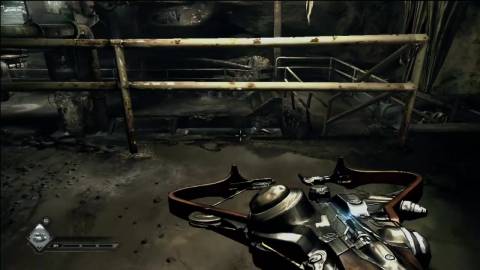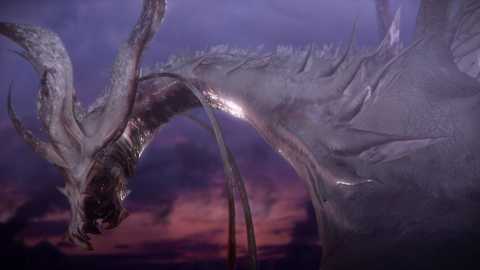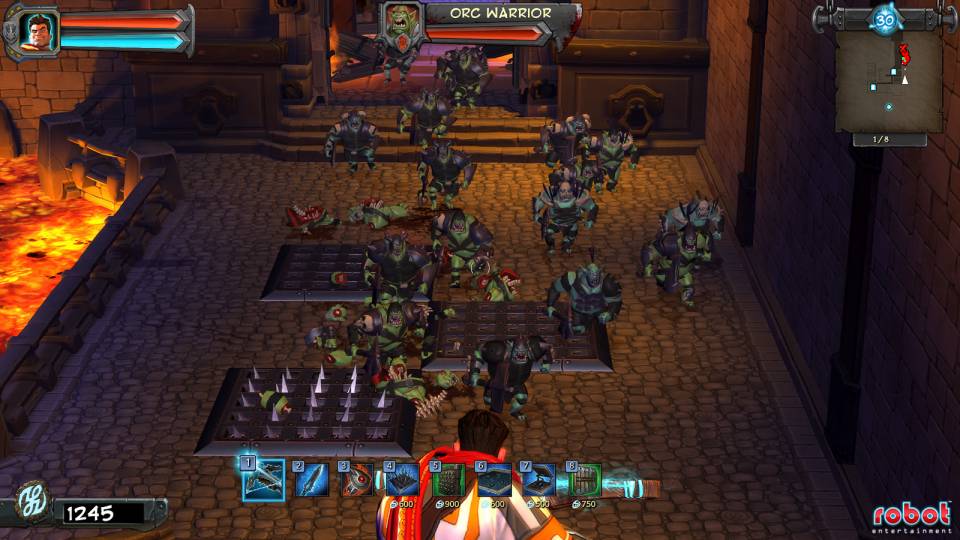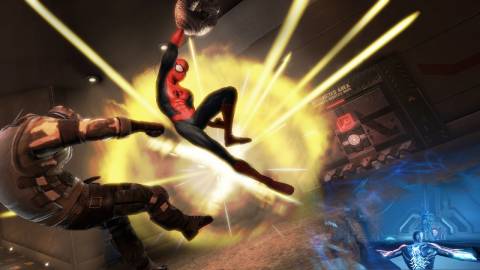Weekend Bender, October 1-7
By spilledmilkfactory 2 Comments
Hello, ladies and gentlemen, and welcome to the Weekend Bender! This is my new weekly blog, where I'll cover every game released over the last week in short, digestible blurbs. Don't like short? Don't like digesting? I'll include links to full reviews of each of the games I deem worthy under their description. And trust me, when I say every game, I mean EVERY game. So won't you join me, dear reader, as I watch my precious sanity trickle through my fingers like so much sand in an hourglass, furiously attempting to bash my head through every game, on every platform, every week?
These last few days have been...difficult. I've been raging all week, and I'm not just referring to id's new shoot 'em up. Rather, I'm talking about Dark Souls. That game is, for lack of a better word, fucked. Other than that, I've indeed been playing lots of RAGE, as well as a trio of mostly disappointing lesser-known games. Activision strikes out with its Marvel properties for a second week in a row and A Game of Thrones Genesis brings the series' all-encompassing reign of awesomeness to a dead halt, while Orcs Must Die does what it can to pick up the slack left by these two disappointing releases.
RAGE
Before you run out to buy RAGE, you should really sit down and study your expectations for the game. The gaming press and many of the game's detractors on the internet have painted a picture of RAGE that is more Fallout than Doom. "Like a marriage between Borderlands and Fallout" seems to be the consensus online. This comparison is, as such simplifications often are, not at all representative of the reality of what the game is. Yes, RAGE takes place on a post-apocalyptic Earth which is colloquially referred to as "The Wasteland," and yes driving features heavily in the game, but these surface similarities are the only connecting threads between id's latest and those other IPs. Rather, playing RAGE is far more akin to (big surprise here) something like Doom. This is a far more linear experience than it might initially appear. The open world is there for the exploring, yes, but it's pretty small (at least so far -- I don't claim to have beaten the game yet) and most of the buildings and caverns actually can't be entered until you get a quest telling you to head to that specific area.

Luckily, there are tons of side quests that will send you all over the world. It's easy, at least so far, to spend more time running errands for the game's numerous locals and running races across The Wasteland than completing the integral story missions. Unfortunately, mission objectives seem to boil down to simple fetch quests more often than not. The actual quests themselves are almost always intense, in the same way that the id classics often were; there are ugly monsters everywhere, and they're running right at you! If you stop to think about it for a second, it's actually kind of simple-minded. The enemy AI displays no great intelligence, and success typically requires no greater strategy than circle-strafing.
At this point it probably sounds like I'm pretty down on RAGE, but actually it's the opposite. Yes, the quests are formulaic, and yes the game is simple, but it's also intense, well-paced, and satisfying. Each of the game's guns sound and feel powerful, and every weapon in the game has a purpose. While there may be a limited number of guns compared to many modern shooters, every one feels like it was put into the game for a specific purpose, and the different ammo types that can be fitted into the weapons add just a hint of strategy to the chaos. A simple crafting system also adds some flair to the game. You can craft anything from bladed boomerangs to explosive RC cars to health packs to lock picks using the scrap you find around the world, and although crafting is simple, it's still exciting to MacGyver something together from a pile of random junk. None of these extraneous details manages to distract from the core of the game's action, though. The savagely intense shooting always takes precedence over the other elements. In this way, RAGE is strikingly similar to some of the best shooters of yesteryear; it's an oldschool game with a shiny veneer of newschool ideas, and it works surprisingly well.
Dark Souls
Sigh. SIGH. Dark Souls, you are a cruel mistress. Having never player its predecessor, Demons Souls, it was with great trepidation that I tiptoed into From Software's bleak world of near-constant death. I tiptoed back out about two hours later, having made virtually no progress and vowing to myself to never play the game again. Straight up, this thing is impenetrable. They use terms and slang that they never even attempt to explain, punishing you when you don't understand even after they don't bother to offer an explanation. When Final Fantasy XIII did this, it was crucified. The key difference between the two games is that Dark Souls gives you the space necessary to learn. It teases you onward with the promise that, if you were to put in the time and effort necessary to learn the game's complex mechanics own your own, with no coddling from the developers or strategy guides, you could actually succeed. So a few hours later I begrudgingly turned the game back on and gave it a second shot.

This is the complex draw of From's Souls games, or so I'm told. I don't want to play this game. It's really not fun. Not even slightly. It frustrates me, fills me with anger, disappointment, and confusion. But everywhere I turn, deep within the mire of hopelessness, there is a light, a potential for hope. If I dedicate enough time to this level, I think to myself, I can master it. I can overcome the odds, and make this section that's been giving me so much trouble my bitch. I just need to try a few more times.
It's sick, this weird draw that the game has. As I already stated, it's not really fun, but in a weird way it's kind of satisfying. There's a certain sense of adventure to not knowing anything about the world you inhabit, to figuring everything out from square one with no one there to take you by the hand and guide you in the right direction. Yes, you will die. But at a certain point, the death becomes a peripheral element of the game. If you're like me, the sense of adventure and discovery will be almost enough to overcome all of that frustration and confusion. Almost. I don't know if I will ever beat Dark Souls. I don't know if I'll even bother to try. But I do know that no other game in recent memory has offered such a breathless feeling of discovery (Bioshock was probably the last one to do it as well as this,) and in a certain strange way, that alone was worth delving into this bleak world.
Orcs Must Die
For a much lighter take on the fantasy world, I turned to Orks Must Die, a fun little fusion of tower defense and action games. I'm a big fan of tower defense, especially the more experimental takes on the genre, and like Double Fine's Trenched (err, Iron Brigade) this one offers a neat spin on the core tenets of the genre. You'll play as a soldier with crossbow and blade, and must set numerous traps to defend the pulsating, magical core of your base. Hordes of orcs are pounding at the doors, and as the title suggests, they all must die.

You can further this goal both directly, by attacking the orcs with blades, bows, and magic, or indirectly, by setting traps at key choke points around the level. Most of them are pretty basic, like spike traps that pop up from the ground or arrow walls that periodically fire projectiles across the room, but others are a bit less traditional. It's fun to experiment with the different traps and their effects, and the game's difficulty ramps up slowly enough to encourage experimentation while at the same time providing a solid challenge. It's essentially the opposite of Dark Souls; it's a lot of goofy, breezy fun, and easily worth a download.
Spiderman Edge of Time
Spiderman games have never really been consistant, so it was with no great surprise that I found the webhead's latest, Edge of Time, to be quite mediocre. Not Xmen Destiny mediocre, mind you, but not good enough to warrant picking up either. Developer Beenox proved with last year's Shattered Dimensions that they were capable of crafting a decent Spiderman game with some interesting mechanics, but here most of the interesting parts have been tossed out the window. This game focuses on Amazing Spiderman and Spiderman 2099, arguable the two least interesting iterations of the wall crawler, exclusively. The big gimmick here is that what Amazing Spiderman does in the past, Spiderman 2099 will feel somehow in the future. This mechanic could have been used to set up some crazy time puzzles, as games like Braid and The Misadventures of PB Winterbottom have proven that time manipulation can make for an intensely compelling gameplay mechanic when handled correctly. In the case of Edge of Time, the problem is not that the mechanic isn't handled well, as much as that it's not handled at all. The plot gimmicks do little to affect the gameplay in any meaningful way. The most significant event I witnessed to this end was Amazing Spiderman pulling a switch in the past to open up a door in the future. It's far from compelling stuff.

Even when not viewed through the distorting prism of missed potential, Edge of Time is less than stellar. The environments are positively stifling; Beenox has slowly moved this series from an expansive open-world thrill ride to a corridor crawler. It doesn't help that almost all of Spiderman 2099's levels take place within the exact same building. Wait, what? Let me repeat that: The entirety of Spiderman 2099's campaign consists of climbing up every floor of a building in sequence. We're talking about Spiderman, for shit's sake! He can climb up the outside of the damn thing in ten minutes!
Decisions such as that reek of either laziness or, far more likely, the constrictions of a one year development cycle. The game's overall lack of ambition, both in terms of the gameplay and the level design, can probably be blamed on the short dev cycle, and that's a real shame because I felt like Beenox was really on to something with Shattered DImensions. As is, the constrictive environments don't give Spiderman's moveset enough room to flex its muscles and the unambitious gameplay design isn't going to be winning any awards.
A Game of Thrones Genesis
While Edge of Time was content with resting on the laurels of the series' past successes, no one can accuse A Game of Thrones Genesis of such lack in ambition. The game aims to make the political backstabbing that characterized the books an integral part of gameplay, theoretically allowing players to win battles through a combination of subterfuge and savagery. I say theoretically because there is clearly a "right" way to win every level, and the experimentation that this concept encourages is quickly squandered by repetitive and unresponsive gameplay. Eventually, it starts to feel like you're just going through the motions necessary for victory. You pull some political backstabbary, then lead your forces onto the battlefield to pull some facestabbary. Rinse and repeat for pretty much the entire campaign.
It doesn't help that the individual elements that comprise the gameplay aren't compelling in the least. All of the political back-and-forth could've been a really neat game mechanic, but it becomes too repetitive too fast. There are obvious right and wrong answers to how you handle yourself politically, and if you go off the rails too much the game will often punish you with failure. Then there's the combat, which feels imprecise and lacking in impact. Combat, in this case, refers to soldiers sort of running at each other and flailing about ineptly until someone accidentally gets hit and actually dies. Sadly, neither the combat nor the political treachery reach the heights of the television show or the books. Fans have often imagined the events leading up to the start of the books, but this story is better left to the imagination.
